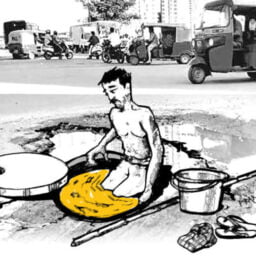INTRODUCTION
Life without liberty cannot be imagined. The concept of personal liberty and bail are complementary to each other and therefore the accused until and unless proven guilty by the court, has the right to get released on bail. Black’s Law Dictionary defines bail as “Procuring the release of a person from legal custody, by undertaking that he/she shall appear at the time and place designated and submit him/herself to the jurisdiction and judgment of the court.”It has been confirmed by a catena of judgements of various courts that bail is the norm and jail is the exception. However, liberty is not absolute and can be curtailed under various circumstances. The bail granted can be cancelled and courts have the power to cancel the bail. Bail can be cancelled in two situations. First, if there is a misuse of liberty or disobeying of conditions (supervening circumstances) on which bail was granted and second, the very order of granting bail was without considering the relevant factors.
SUPERVENING CIRCUMSTANCES
If the accused who has been released on bail misuses this liberty or does something which violates the conditions on which the bail was granted then the bail can be cancelled. In supervening circumstances, bail can be cancelled by superior courts and the very court which has granted the bail. Section 439(2) of CRPC provides that “A High Court or Court of Session may direct that any person who has been released on bail under this Chapter be arrested and commit him to custody”. These circumstances include attempting to flee the country, threatening the witnesses, tampering with evidence etc. If it is found that there is suppression of important facts and the accused was involved in other criminal offences then it is also a reason for cancellation of bail. Every activity which will not lead to a fair trial can be a ground for cancellation of bail.
In-State (Delhi Administration) v. Sanjay Gandhi, the court stated that bail cancellation demands a re-evaluation of a previously made decision and is normally only allowed if allowing the accused to stay free during the trial will jeopardise a fair trial due to new facts.
In NityanandRai v. State of Bihar (2005) 4 SCC 178, the Supreme Court has opined that whatever the reasons for cancellation of bail are, they should have arisen after granting of bail. Furthermore, the grounds should be such that they may easily be linked to the accused’s behaviour while on bail.
In Ram Govind Upadhyay v. Sudarshan Singh and Others, it has been opined that Although the Court’s discretion is exercised in granting bail, this discretion must be exercised with care. The heinous nature of the crime necessitates additional care, and there is a greater risk of denying bail, albeit this is depending on the facts of the case.
IN THE ABSENCE OF SUPERVENING CIRCUMSTANCES
Even in absence of supervening circumstances, the bail can be cancelled if it is found that the court erred while granting the bail and it was granted without any due application of mind. In such cases, the bail can be cancelled by superior courts only. Some examples of this situation are:
- The accused was a habitual offender and it was not considered by the court while granting bail.
- When the court has not considered important facts while granting bail or there is an apparent discrepancy committed.
- If many serious charges are levelled against the accused which makes it clear that bail should not have been granted in the first place itself.
- The accused was in a powerful position in comparison with the victim especially in a matter involving abuse of power.
The important aspect of the concept of bail is to balance individual liberty along with the interest of society. Therefore, the court while hearing an application for cancellation of bail has to be tough and should examine whether the violations have taken place or is it just the possibility of violating the conditions of bail.
According to the Supreme court in the case of Ash Mohammed v. Shiv Raj Singh @ LallaBabu and another, there is no single universal norm that applies to all cases. As a result, there can be many reasons other than the accused violating the bail bond. A court has the authority to critically examine the bail order in light of such observations. Furthermore, it should double-check its reasons to prevent issuing an arbitrary order while cancelling an accused’s bail, because the court’s decision affects an individual’s liberty, making it all the more accountable for its decision.
In Dr Narendra K. Amin v. State of Gujarat and another, it has been observed that when unimportant materials are taken into account, the decision to issue bail becomes shaky. The order can be thrown aside by the superior court if it is erroneous.
In Manoj Kumar Khokhar v. State of Rajasthan And Anr, The Supreme Court held that bail cannot be granted by a cryptic and causal order without considering the material aspects of the case. The Apex Court further clarified that even if no new circumstances have developed after the grant of bail, the State is entitled to seek cancellation of bail, if it had been granted ignoring material aspects that establish a prima facie case against the accused.
CONCLUSION
Like every other branch of law, the law of bail also has its philosophy and performs an important role in the administration of justice. The concept of bail arises from a conflict between the presumption of innocence in the accused’s favour and the police’s power to curtail the liberty of a man accused of a crime. It is important to remember that an accused individual who is free can defend himself better and is in a much better position to handle his case and in court than someone who is in detention. Courts routinely refuse to cancel bail because it jeopardises the person’s liberty. Bail is only revoked by the courts when they discover very compelling and overwhelming evidence against the accused. As a result, it is evident that a court must proceed with extreme caution when dealing with a bail cancellation case. The cancellation of bail will have a significant impact on the individual’s liberty. Due to this, it should not be taken casually. Cancellation of Bail is introduced in the law to ensure that justice is served in society by barring an accused who has been released on bond from committing something criminal in a heinous crime. Even though there has been no misuse of the release granted to the accused, his bail may be revoked if the allegations levelled against him are exceedingly serious.
Author(s) Name: Ashish Chhabra (Rajiv Gandhi National University of Law, Patiala)
















